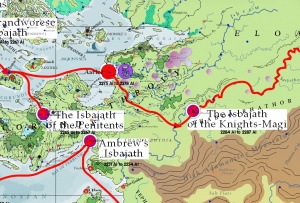Difference between revisions of "Fifth Isbajath"
Trismegistus (talk | contribs) m (additions) |
Trismegistus (talk | contribs) m |
||
| Line 1: | Line 1: | ||
| − | The Fifth Isbajath is a war celebrated in song and poetry that led to the slaying of [[Prince Ulcanov of the Shattered Waters]], ruler of [[Aurice]] and [[Throvy]]. The liberation of his dominion began in earnest in 2275 and came to conclusion in 2278. The bulk of warriors voyaged by boat from [[Deliops]] and landed on the peninsula before crossing to the islands of [[Aurice]]. These were largely veterans of the [[Durandwórese Isbajath]], 2259 to 2261. Their number included [[Gidhoniel kab S'ephah]], [[Asenath kath | + | The Fifth Isbajath is a war celebrated in song and poetry that led to the slaying of [[Prince Ulcanov of the Shattered Waters]], ruler of [[Aurice]] and [[Throvy]]. The liberation of his dominion began in earnest in 2275 and came to conclusion in 2278. The bulk of warriors voyaged by boat from [[Deliops]] and landed on the peninsula before crossing to the islands of [[Aurice]]. These were largely veterans of the [[Durandwórese Isbajath]], 2259 to 2261. Their number included [[Gidhoniel kab S'ephah]], [[Asenath kath Miyanikhiya]], and [[Amnwbis of Medibgö]], some of the greatest Incarnandist psychic warriors of the age. Gidhoniel wielded the Sword [[Wanewake]] with which he slew many minions of the Dark Prince and ultimately the Dark Prince himself. The conflict and victory are a great monument in the historic consciousness of [[Goscundy]] and [[Aurice]]. |
[[File:FifthIsbajath_RouteofTisbajuma.jpg|thumb|300px|The route of the Tisbajuma of the Fifth Isbajath]] | [[File:FifthIsbajath_RouteofTisbajuma.jpg|thumb|300px|The route of the Tisbajuma of the Fifth Isbajath]] | ||
| Line 10: | Line 10: | ||
*[[Prince Ulcanov of the Shattered Waters]] | *[[Prince Ulcanov of the Shattered Waters]] | ||
*[[Khavost Olima]]: commander in service to Prince Ulcanov | *[[Khavost Olima]]: commander in service to Prince Ulcanov | ||
| − | *[[Asenath kath | + | *[[Asenath kath Miyanikhiya]]: General commander of the Tisbajuma, first daughter of Besheth Incarnandina, sister to Gidhoniel kab S'ephah |
*[[Gidhoniel kab S'ephah]]: son of Besheth, slayer of Prince Ulcanov | *[[Gidhoniel kab S'ephah]]: son of Besheth, slayer of Prince Ulcanov | ||
*[[Amnwbis of Medibgö]]: Medibgóëse, slayer of Khavost Olima, slain in turn by Prince Ulcanov | *[[Amnwbis of Medibgö]]: Medibgóëse, slayer of Khavost Olima, slain in turn by Prince Ulcanov | ||
Revision as of 23:39, 21 July 2014
The Fifth Isbajath is a war celebrated in song and poetry that led to the slaying of Prince Ulcanov of the Shattered Waters, ruler of Aurice and Throvy. The liberation of his dominion began in earnest in 2275 and came to conclusion in 2278. The bulk of warriors voyaged by boat from Deliops and landed on the peninsula before crossing to the islands of Aurice. These were largely veterans of the Durandwórese Isbajath, 2259 to 2261. Their number included Gidhoniel kab S'ephah, Asenath kath Miyanikhiya, and Amnwbis of Medibgö, some of the greatest Incarnandist psychic warriors of the age. Gidhoniel wielded the Sword Wanewake with which he slew many minions of the Dark Prince and ultimately the Dark Prince himself. The conflict and victory are a great monument in the historic consciousness of Goscundy and Aurice.
Events
Notable Participants
- Prince Ulcanov of the Shattered Waters
- Khavost Olima: commander in service to Prince Ulcanov
- Asenath kath Miyanikhiya: General commander of the Tisbajuma, first daughter of Besheth Incarnandina, sister to Gidhoniel kab S'ephah
- Gidhoniel kab S'ephah: son of Besheth, slayer of Prince Ulcanov
- Amnwbis of Medibgö: Medibgóëse, slayer of Khavost Olima, slain in turn by Prince Ulcanov
- Olmima Olima of the Glade: daughter of Khavost, converts to Incarnandism and founds a monastic order
Quadricentennial Celebration of the Liberation of Aurice
In 2678, the city of Aurice celebrated the four hundredth anniversary of its liberation from the tyranny of Prince Ulcanov. Fireworks and titancraft illuminations were lit from hundreds of boats around the islands on both the night before the day of celebrations and the evening of the day.
Sources
Primary
- Exhortations of S'ephah kab Shaykhul, Late 23rd century, speeches, advice and wisdom given by S'ephah kab Shaykhul, father of Gidhoniel and husband to Incarnandina Besheth kath Miyanikhiya
- The Glamsagin Chronicle, ca 2290, history, Ra'esel kab Naphug, relates Fifth Isbajath and related historical events
- Teltagurn Fresco, late 23rd century
Secondary
- Children of Besheth, 2614, Children of the Incarnandina and their roles in the Psychic Crusades, especially Fifth Psychic Crusade, Throvian Language
- Five Lives of the Princes of Chaos, 2579,Amric Ethuve, biography of five chaos rulers, including Prince Ulcanov
- God's Whirlwind: The Isbajutha, 2568, Thulinantis Tepriax of Zamaclë, Ithatian Language, outlines and highlights the chief events of the Isbajutha (2423 to 2476) and discusses the swiftness and far-reaching consequences
- Legend of Saint Gidhoniel, 2400s, a chanson in Khahonri Language about Saint Gidhoniel kab S'ephah in the Fifth Isbajath
- Our Heritage of Incarnandist Saints, 2619, Rhionantis the Younger of Aurice, lists numerous Incarnandist Saints through the centuries with emphasis on Throvian Saints like St. Olmima Olima of the Glade; Throvian Language
See Also
| This article is a stub. It requires further development by the creator. |
